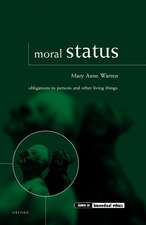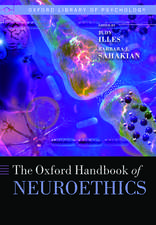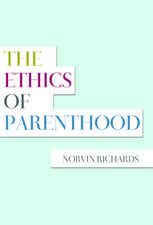Endemic: Essays in Contagion Theory
Editat de Kari Nixon, Lorenzo Servitjeen Limba Engleză Hardback – 14 sep 2016
The chapters explore both endemicity itself and how epidemic discourse has become endemic to processes of social construction. Designed to simultaneously prime those new to the discourse of humanistic perspectives of contagion, complicate issues of interest to seasoned scholars of science and technology studies, and add new topics for debate and inquiry in the field of bioethics, Endemic will be of wide interest for researchers and educators.
Preț: 1002.44 lei
Preț vechi: 1222.48 lei
-18% Nou
Puncte Express: 1504
Preț estimativ în valută:
191.81€ • 200.29$ • 158.39£
191.81€ • 200.29$ • 158.39£
Carte tipărită la comandă
Livrare economică 15-29 aprilie
Preluare comenzi: 021 569.72.76
Specificații
ISBN-13: 9781137521408
ISBN-10: 1137521406
Pagini: 280
Ilustrații: XVII, 300 p. 2 illus. in color.
Dimensiuni: 148 x 210 x 22 mm
Greutate: 0.52 kg
Ediția:1st ed. 2016
Editura: Palgrave Macmillan UK
Colecția Palgrave Macmillan
Locul publicării:London, United Kingdom
ISBN-10: 1137521406
Pagini: 280
Ilustrații: XVII, 300 p. 2 illus. in color.
Dimensiuni: 148 x 210 x 22 mm
Greutate: 0.52 kg
Ediția:1st ed. 2016
Editura: Palgrave Macmillan UK
Colecția Palgrave Macmillan
Locul publicării:London, United Kingdom
Cuprins
The Making of a Modern Endemic: An Introduction; Lorenzo Servitje and Kari Nixon.- Part I. Contagious Culture and Cultures of Contagion.- Chapter 1. Contagion and Anarchy: Matthew Arnold and the Disease of Modern Life; Lorenzo Servitje.- Chapter 2. Dark Zones: The Ebola Body as a Configuration of Horror; Catherine Belling.- Chapter 3. Needles and Bullets: Media Theory, Medicine, and Propaganda; Ghislain Thibault.- Part II. Digital Virality. Chapter 4. Immunizing the Social Network: Public Health and the "Troubled Teenager" in Digital Media; Olivia Banner.- Chapter 5. The Writing is on the Wall: Epidemiology and the Anticipated Ends of Social Media; Kimberly Hall.- Part III. Theorizing the Politics of Contagion in a Neoliberal World.- Chapter 6. Intestine Disorder: Neoliberalism Biomial Politics; Robert Geroux.- Chapter e Shootings, Neuroscientifc Imaginaries and Neuroscientifc Futures; Stephen Casper.- Chapter 8. Infecting Humanness: A Critique of the Autonomous Self in Contagion; Yunjin Woo.- Part IV. Reconstructing Contagion.- Chapter 9. Thinking like a Virus: Contagion, Postmodernist Epistemology, and Ethics; Mathieu Donner.- Chapter 10. Figuring the Other Within: The Gendered Underpinnings of Germ Narratives; Laurel Bollinger.- Chapter 11. Dying a Natural Death: Ethics and Political Activism for Endemic Disease; Claire Hooker et al.
Notă biografică
Kari Nixon is the Hughes Postdoctoral Fellow at Southern Methodist University, USA. Her work examines the intersection of culture, microbiology, and epidemiology.
Lorenzo Servitje is a Doctoral Candidate in English at the University of California, Riverside, USA. His work examines the mutual constitution of literature and medicine in the Victorian era, in addition to representation of medical discourse in popular culture.
Textul de pe ultima copertă
This book develops a new multimodal theoretical model of contagion for interdisciplinary scholars, featuring contributions from influential scholars spanning the fields of medical humanities, philosophy, political science, media studies, technoculture, literature, and bioethics. Exploring the nexus of contagion's metaphorical and material aspects, this volume contends that contagiousness in its digital, metaphorical, and biological forms is a pervasively endemic condition in our contemporary moment.
The chapters explore both endemicity itself and how epidemic discourse has become endemic to processes of social construction. Designed to simultaneously prime those new to the discourse of humanistic perspectives of contagion, complicate issues of interest to seasoned scholars of science and technology studies, and add new topics for debate and inquiry in the field of bioethics, Endemicwill be of wide interest for researchers and educators.

















